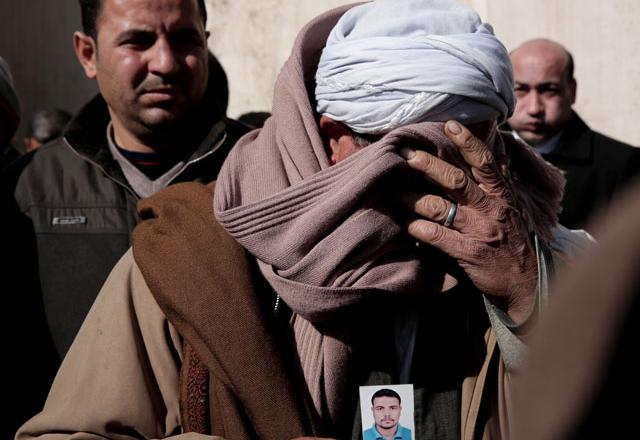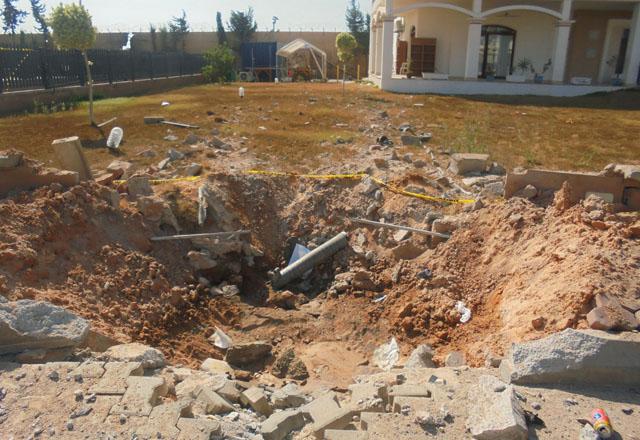You are here
Libya issues warning after PM escapes assassination
By AFP - May 28,2015 - Last updated at May 28,2015
BENGHAZI, Libya — The armed forces of Libya's recognised government warned Wednesday they would react to any aggression against the state, a day after the prime minister escaped an assassination attempt.
Libya plunged into chaos after the 2011 NATO-backed uprising that toppled and killed long-time dictator Muammar Qadhafi, with battle-hardened former rebels armed with heavy weapons carving out their own fiefdoms.
"The forces of the national army and the security services affirm their support for the legal government and commit to protecting it against any obstacles or aggression hampering its work," a statement on the government's news agency said.
It came after Prime Minister Abdullah Al Thani escaped unscathed when would-be assassins opened fire on his car on Tuesday after a session of parliament in the eastern city of Tobruk.
"Any aggression against the seat of government and sovereign state institutions will be followed by a state response using its strength and legality, with force and firmness," the statement said.
Thani's spokesman said after his car was hit by bullets, wounding a bodyguard, that it had been an attempt to kill the premier.
"It was an assassination attempt, and the prime minister survived it," Hatem El Ouraybi told AFP.
The elected parliament recognised by the international community has been based in Tobruk near the border with Egypt since the Fajr Libya militia coalition seized the capital last August.
The government is also based in the east.
Tripoli hosts a rival government and parliament that is close to Fajr Libya (Libya Dawn).
Tuesday's shooting came after a meeting of parliament at its Tobruk headquarters.
Parliament spokesman Faraj Abu Hashem said gunmen had tried to storm the building but were driven back.
"The parliament was questioning the government work in a session today, when we heard gunshots outside," he said over the phone.
"Members of the government and the prime minister left immediately as gunmen tried to storm the parliament... but forces prevented them from entering."
Government impotence
The United Nations has for months struggled to broker a deal between warring parties through the creation of a national unity government, while Egypt is hosting a meeting this week of Libyan tribal chiefs to bring peace to its oil-rich neighbour.
The bid to kill Thani comes four months after Libya's then-interior minister escaped an attempt on his life in Tripoli.
That came three weeks after deputy industry minister Hassan Al Droui was shot dead in Qadhafi's hometown of Sirte.
Thani's attempted assassination deep in his own stronghold reflected the impotence of the two rival governments, according to a former lawmaker turned political activist.
This "clearly reflects the fact that the two governments of Libya, who do not have a real budget, are facing complex security challenges and demands of the people they are unable to realise”, said Othman Ben Sassi.
"The people are unhappy, and they understand that the two governments have neither the money nor the tools to act on important issues."
Both governments regularly announce meetings as well as political, economic and military decisions or debates on the budget, but they do not have the tools to implement them.
According to an official in the central bank, which now plays a leading role in managing Libya's finances, "many of the decisions made in Tripoli or Tobruk have no impact".
The anti-graft watchdog Transparency International ranked Libya 166th out of 175 countries in its Corruption Perceptions Index for 2014.
Faced with this situation, the population is unhappy.
"Everything is at a standstill: the economy, construction, and sales and purchases — but not war and corruption," bemoaned one Tripoli shop owner who would only gave his name as Ihab.
Related Articles
TRIPOLI — Libya's internationally recognised prime minister, Abdullah Al Thani, has withdrawn an offer to resign, a move which would have ad
The head of Libya's recognised government has pleaded for more help from the international community, warning that the country could become a dangerous haven for jihadists on Europe's doorstep.
Libya's toothless outgoing government admitted Monday from its safe refuge in the east of the country that it has in effect lost control of Tripoli to armed militias.


















